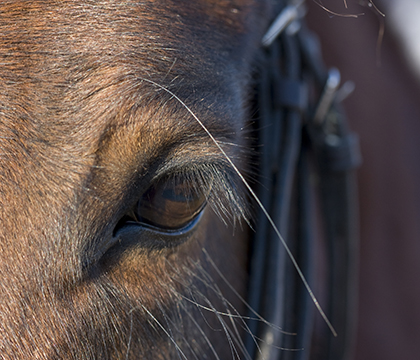
EHV-1 confirmed in horses near Saskatoon
Equine herpes virus 1 (EHV-1) has been confirmed in two horses with neurologic disease being boarded at a stable near Saskatoon.
By WCVM Today
EHV-1 is a common equine virus to which nearly all horses are exposed during their lifetime. EHV-1 usually causes mild respiratory disease, but in some cases, the virus can spread to other parts of the body. In rare cases, the virus can affect the nervous system and cause the neurological form of EHV-1 to develop. It can also cause abortions in pregnant mares.
EHV-1 is not transmissible to humans and most animal species, but the virus is highly contagious among horses and camelids (llamas and alpacas). It's mostly spread by direct contact, i.e. horses coming into contact with one another. Indirect contact (e.g. sharing contaminated equipment or people moving between horses without adequate hygiene procedures) and aerosol transmission over close distances (e.g. when horses cough and form infectious droplets) may also contribute.
The boarding stable is under voluntary quarantine, with the two afflicted horses in isolation and receiving treatment and supportive care. Western College of Veterinary Medicine clinicians are working very closely with the stable to monitor the cases as they progress.
A detailed fact sheet can be found here.
WCVM experts will host a free, public event to discuss EHV-1 on Thursday, Mar. 24 from 6 until 8 p.m. on the U of S campus. Click here for more information and registration.
EHV-1 is not transmissible to humans and most animal species, but the virus is highly contagious among horses and camelids (llamas and alpacas). It's mostly spread by direct contact, i.e. horses coming into contact with one another. Indirect contact (e.g. sharing contaminated equipment or people moving between horses without adequate hygiene procedures) and aerosol transmission over close distances (e.g. when horses cough and form infectious droplets) may also contribute.
The boarding stable is under voluntary quarantine, with the two afflicted horses in isolation and receiving treatment and supportive care. Western College of Veterinary Medicine clinicians are working very closely with the stable to monitor the cases as they progress.
A detailed fact sheet can be found here.
WCVM experts will host a free, public event to discuss EHV-1 on Thursday, Mar. 24 from 6 until 8 p.m. on the U of S campus. Click here for more information and registration.
